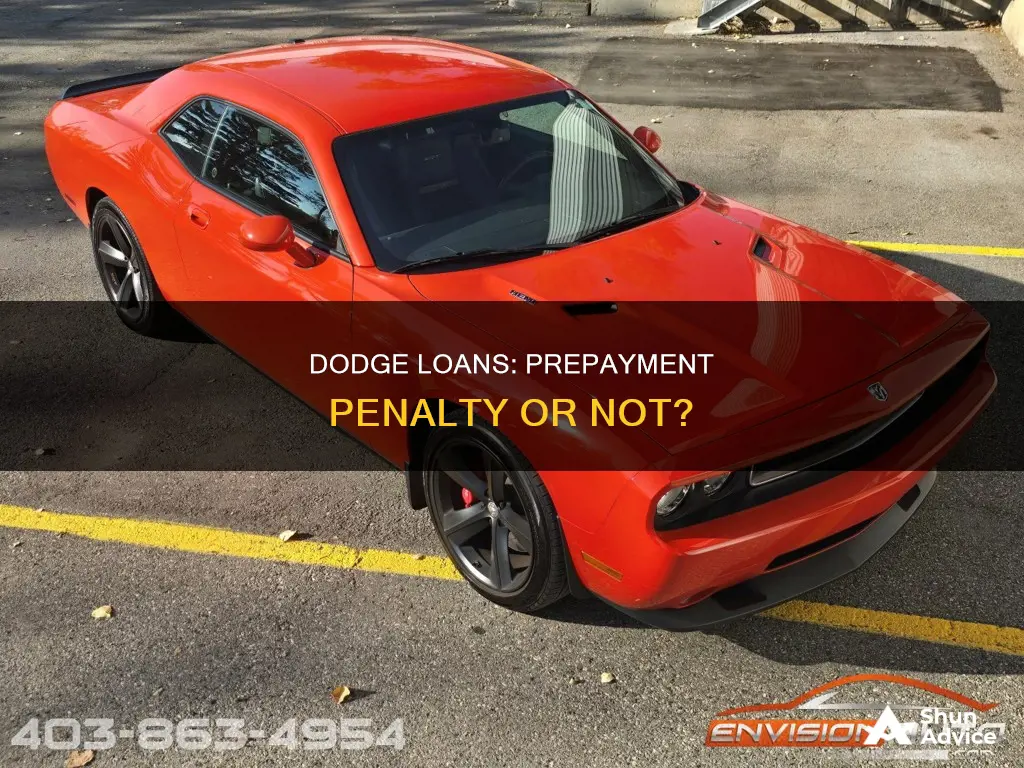
Prepayment penalties are fees charged by lenders when a borrower pays off a loan early or makes extra payments. These fees are common with auto loans and can be costly, often accounting for 2% of the remaining loan balance. While prepayment penalties are not banned by federal law, certain states have prohibited state-run banks and institutions from imposing them. Borrowers can avoid these penalties by carefully reviewing loan documents and discussing them with lenders before signing. Some lenders may even negotiate to have the prepayment penalty removed.
What You'll Learn
- Dodge financing is provided by Chrysler Capital Finance, which offers various deals and promotions throughout the year
- Prepayment penalties are fees for paying off a loan early, and they are common with auto loans
- These fees can impact your ability to pay down the principal and make refinancing more difficult
- While not all lenders or states allow prepayment penalties, it is important to discuss and review contract details to avoid unexpected charges
- Some lenders use alternative methods to achieve the same purpose as prepayment penalties, so careful review of loan documents is essential

Dodge financing is provided by Chrysler Capital Finance, which offers various deals and promotions throughout the year
Chrysler Capital Finance is the financing company for Dodge, which is owned by its parent company, Chrysler. The financing deals offered by Chrysler Capital Finance depend on your ZIP code and the model you're buying or leasing. Some common deals include a discounted annual percentage rate (APR), cash back, or a reduced down payment. These deals are typically offered during promotional sales events, which fluctuate throughout the year.
Chrysler Capital Finance also provides exclusive financing specials and perks, such as the Driveability program, which offers a rebate of up to $1,000 for individuals with disabilities who install adaptive equipment in their new Dodge vehicles. They also offer two certified pre-owned vehicle (CPOV) programs with rigorous inspections and warranties.
In addition to these perks, Chrysler Capital Finance offers special deals for certain professions, such as first responders, military members, and veterans who may be eligible for discounts or cash back on certain models and model years. Additionally, employees of partner companies can get their new vehicle for 1% below MSRP.
It's important to note that Chrysler Capital Finance typically requires a credit score of at least 620 to qualify for financing. However, credit score requirements may vary for banks and online lenders.
When considering Dodge financing, it is essential to be aware of potential prepayment penalties. Prepayment penalties are fees charged by some lenders if a borrower pays off a loan early or makes extra payments. While not all lenders or states allow prepayment penalties, it is crucial to review your contract and discuss any potential fees with your lender before signing.
DCU Pre-Approval Process: Quick and Easy Loan Approvals
You may want to see also

Prepayment penalties are fees for paying off a loan early, and they are common with auto loans
Prepayment penalties are fees charged by lenders when a borrower pays off a loan early or makes extra payments. These fees are common with auto loans and can be around 2% of the remaining loan balance. For example, if you have $7,000 remaining on your loan, you would have to pay a $140 fee for early repayment.
Not all lenders will penalize borrowers for early repayment, and not all states allow prepayment penalties. In 36 states and Washington, D.C., lenders can charge prepayment penalties on loans with terms of 60 months or fewer. Federal law prohibits lenders from charging prepayment penalties on loans with longer terms.
Prepayment penalties can make refinancing an auto loan challenging and more expensive. They can also make it harder to pay down the loan principal. Therefore, it is essential to discuss prepayment penalties with your lender before taking out a loan and to compare options with no prepayment clauses.
If you are considering an auto loan from Dodge, your financing company will be Chrysler Capital Finance, Dodge's parent company. It is essential to review your loan options and discuss prepayment penalties with Chrysler Capital Finance before committing to a loan.
Depth Management: Unsecured Loans and Their Coverage
You may want to see also

These fees can impact your ability to pay down the principal and make refinancing more difficult
Prepayment penalties are fees charged by lenders when a borrower repays a loan before the end of the loan term or makes extra payments. These fees typically account for 2% of the remaining loan balance. While paying off a loan early can feel satisfying, it is not always the best financial decision due to these penalties.
Prepayment penalties can impact your ability to pay down the principal and make refinancing more difficult in several ways. Firstly, by paying a penalty, you are effectively increasing the cost of borrowing, which reduces the amount of money you have available to pay down the principal. Secondly, prepayment penalties can make refinancing your loan unattractive. When you refinance a loan, you typically have to pay off the original loan in full, which can trigger a prepayment penalty. This additional cost may outweigh the benefits of refinancing, such as obtaining a lower interest rate or more favourable terms.
Additionally, some lenders use alternative methods to discourage early loan repayment. For example, they may employ the "Rule of 78s", where payments are allocated to pay off the full amount of interest before any payments are applied to the principal. This means that even if you make extra payments, they will not reduce the principal, and you will still be responsible for the total interest charges.
It's important to carefully review the loan documents and be vigilant for any mention of prepayment penalties, pre-computed loans, or the "Rule of 78s". These clauses must be disclosed in the loan documents, so transparency should be expected from lenders. If you are unsure, consult a legal expert to review the documents and explain the potential implications.
To avoid prepayment penalties, discuss them with your lender before taking out the loan. Be upfront and ask if there are any penalties for early repayment. Many lenders, including banks and credit unions, do not impose prepayment penalties, so it is worth shopping around for a loan that aligns with your financial goals and provides flexibility in repayment.
Current Loans: What You Need to Know
You may want to see also

While not all lenders or states allow prepayment penalties, it is important to discuss and review contract details to avoid unexpected charges
Although not all lenders or states allow prepayment penalties, they are still permitted in 36 states and Washington D.C. for loans with a term of 60 or fewer months. Therefore, it is crucial to discuss prepayment penalties with your lender and review your contract details to avoid unexpected charges.
Prepayment penalties are fees charged by lenders when borrowers pay off loans early or make extra payments. These fees are common with auto loans and can be around 2% of the remaining loan balance. They can make refinancing more challenging and less financially viable. While paying off debt early may seem appealing, it is not always the best financial decision due to these potential penalties.
Before taking out a loan, it is essential to carefully read and understand the loan documents. Prepayment penalties or clauses must be disclosed in the loan documents, so watch for phrases like "prepayment penalties," "pre-computed loan," or "the full amount of interest." Some lenders may use alternative techniques to achieve the same purpose, such as the "Rule of 78s," which prioritises interest payments. By reading the documents thoroughly, you can identify and negotiate to remove any undesirable clauses before signing.
Additionally, consider your credit score and loan term. In the past, individuals with poor credit or repayment history were more likely to be offered loans with prepayment penalties. Today, while this practice is less common, it is still important to be vigilant, especially if you have bad credit or are taking out a long-term loan.
To summarise, while not all lenders or states impose prepayment penalties, it is crucial to discuss this topic with your lender and carefully review your contract to avoid surprises. By understanding the terms, calculating potential interest savings, and being aware of alternative loan options, you can make informed decisions that align with your financial goals.
Consolidating Private Loans: Forfeit Federal Benefits?
You may want to see also

Some lenders use alternative methods to achieve the same purpose as prepayment penalties, so careful review of loan documents is essential
Prepayment penalties are fees enforced by lenders when a borrower pays off a loan early or makes extra payments. These fees are intended to compensate lenders for the interest they lose when a loan is paid off early. While prepayment penalties are common with auto loans, not all lenders and loans charge prepayment penalties.
Some lenders use alternative methods to achieve the same purpose as prepayment penalties. For example, some lenders may offer an alternative loan that does not include a prepayment penalty but may have a higher interest rate. Others may provide a loan with a prepayment penalty but allow borrowers to negotiate the removal of the penalty for a fee. Some lenders may also offer loans with soft prepayment penalties, which only charge a fee if the borrower refinances the loan, but not if they sell the asset.
It is essential to carefully review loan documents and consult with the lender to understand the specific prepayment penalty policies. The prepayment penalty method used for a particular loan should be clearly outlined in the loan documents, and lenders are legally required to disclose this information upfront. Borrowers can also ask the lender to point out the prepayment penalty clause in the contract.
Additionally, borrowers should be aware of the different types of prepayment penalties, such as fixed-amount penalties, penalties based on a percentage of the loan balance, or penalties based on a fixed number of months' interest on the remaining balance. Understanding the terms and conditions of the prepayment penalty will enable borrowers to make informed financial decisions and negotiate better terms if needed.
In summary, while prepayment penalties are common, they are not universal, and careful review of loan documents is crucial to understanding the specific terms and conditions. Borrowers should also be aware of their rights and protections, as prepayment penalties are not legal in all states, and federal law prohibits lenders from charging prepayment penalties on loans with longer terms.
Discover's RV Loan Options: What You Need to Know
You may want to see also
Frequently asked questions
Prepayment penalties are fees charged by lenders when a borrower pays off a loan early or makes extra payments. These fees are common with auto loans and can often be 2% of the remaining loan balance.
Dodge financing deals depend on your ZIP code. If you get a loan directly from Dodge, your financing company will be Chrysler Capital Finance. While it is not clear if they enforce prepayment penalties, it is always best to discuss this with your lender before taking out a loan.
Prepayment penalties must be disclosed in loan documents, so read your contract carefully. If you are shopping for a car or auto loan, ask your lender or dealer if your contract has a prepayment penalty. You can also check your state law to see if it is prohibited.







